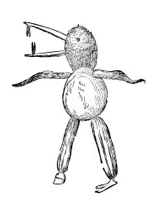How did you come to poetry?
When I was an undergraduate I didn't know I wanted to be a poet—I just knew I wanted to be an American artist. I tried on a lot of things, most of which I wasn't particularly good at: saxophone, and mime, and ballet. I would have loved to have been a painter (I would still love to be a painter!) but I didn't try that. What I had some proclivity for and facility with was language. I seemed to avoid committing to it as long as I could, though I ate books, I just ate them. When I was seventeen I met a ferocious auto-didact. She had an Irish and German Catholic upbringing from Kentucky, and she knew all of the Irish and German writers, the Catholics. She turned me on to everyone from Hopkins to Joyce. It wasn't until I went to graduate school in Arkansas that I really started reading contemporary poetry. The poet whose work I fell deepest into was Frank Stanford's. His poems were very potent, romantic, mysterious. I recognized that very idiom, that very landscape. And he was my age, he was already doing it—I didn't have to die, become a man or a Catholic from across the waves to become a poet. Living proof was important to me.
When you first became interested in poetry you thought it was removed from you?
I thought it was something made elsewhere, essentially a European export. I thought writers didn't come from my place, that it couldn't yield that. Nothing in the library told me my beloved backwater yielded its own literature. Stanford's work was the unbeatable proof of otherwise.
Do you read mostly contemporary poetry, or older poetry? Are there certain poets you always return to?
My reading changes all the time. There were periods when I was cycling the same poets. Now I'll read anything, and I also won't read anything. I have to be taken in deep really fast or I won't read it. I don't care where it comes from. It has to have a title, but I'd just as soon it did not have a name attached. There are poets I could say are really important to me, but then I almost have to question if that's true. It's really books: Erin Moure's Sheepish Love, Civilian Beauty, Evan S. Connell's Notes Found in a Bottle on a Beach at Carmel, Arthur Sze's River River, Philip Foss's Composition of Glass, Mei Mei Berssenbrugge's Empathy, Forrest's Deeds of Utmost Kindness, David Antin's Tuning, Merwin's Notes on An Unfinished Accompaniment, Michael Ondaatje's Collected Works of Billy the Kid, Ron Silliman's Ketjak, Creeley's For Love, Bronk's Life Supports, Bernadette Mayer's Midwinter Day, Cole Swensen's Park, Frank Stanford's Constant Stranger, Palmer's Notes From Echo Lake, Lorine Niedecker's The Granite Pail, Oppen's Selected, Frank O'Hara's Selected, Forche's The Country Between Us, Lyn Hejinian's My Life, Jacque Roubaud's Some Thing Black. Even the poets I love—it's usually the one title that affected me first and foremost. After that I'm along for the ride, and I can continue to be astonished. But that first hit is what clobbers me, and sometimes a later work, such as Ashbery's Flow Chart and Merwin's The Folding Cliffs, and Ondaatje's Handwriting, etc. will keep giving back to you in their fullness.
You've said, "I'm not a reliable critic, even for my own purposes." Does that unreliability keep you open as a reader, and as a writer?
I don't want to shut down. You see a recoiling from the adventure of new writing happening to people, and it's not a place where I want to settle. Also, I remember in some recent interview I talked about coming to love Donald Judd's work. When I was twenty-one I got a job at Park-Bernet Galleries, and pretty soon into the job we had a contemporary art show I did not like one bit. Most of all, I didn't like the work of Dan Flavin, Claes Oldenberg, Robert Indiana, Jasper Johns—I had never seen any of that stuff, and it all just looked ridiculous to me. However, over time I found that when I went to a museum I started going toward the new stuff, especially Donald Judd's work, which did nothing except be there, you know. It was cool and beautiful, but it just didn't evoke any references for me, and so I felt like I could be still, could be quiet with just a few copper boxes. And I feel like I look for that in writing too—somewhere I can get a clearing so that I can see something that I haven't seen before. It's very hard to find that clearing. You also asked if I read from the past, and I do. In poetry it took a long time before I became interested in the past; in prose it didn't. I love the nineteenth century, and I'd be happy to just stay there in prose. To read Hardy. But in poetry it took me a while to go back. I felt too behind to go backward.
Do you remember that moment?
No, I just needed more than my contemporaries to sustain me.
Do you think about your audience, or who you'd like your audience to be?
Like any writer, I want the writers that I like to read to like my work. And then I want really smart, unusual people to like my work. I want people that I'd want to spend time with to like my work. And I want strangers who are in very lost places to like my work. But no writer writes to that audience when writing. For the last ten years I've worked a lot with a photographer, so my environment is whatever project we're working on. . . .
To read the rest of this interview, please click here to purchase JUBILAT 5



